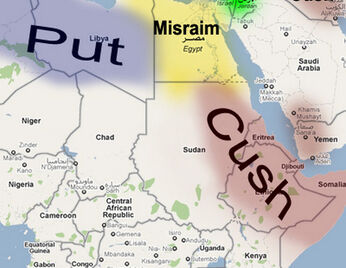Biography[]
Mizraim, per the Book of Genesis, the son of Ham and a grandson of Noah who fathered the many Mizraim tribes that settled in the land of Egypt.
Mizraim (Hebrew: מִצְרַיִם / מִצְרָיִם, Modern Mitzráyim Tiberian Miṣrāyim / Miṣráyim ; cf. Arabic مصر, Miṣr) (/mɪt͡srai:m/) is the Hebrew and Aramaic name for the land of Egypt, with the dual suffix -āyim, perhaps referring to the "two Egypts": Upper Egypt and Lower Egypt.
Neo-Babylonian texts use the term Mizraim for Egypt.[1] The name was for instance inscribed in the famous Ishtar Gate of Babylon.[citation needed] Ugaritic inscriptions refer to Egypt as Mṣrm,[2] in the Amarna tablets it is called Misri,[3] and Assyrian records called Egypt Mu-ṣur.[4] The Arabic word for Egypt is Miṣr (pronounced Maṣr in Egyptian colloquial Arabic), and Egypt's official name is Gumhuriyyat Miṣr al-‘Arabīyyah (the Arab Republic of Egypt).
According to Eusebius' Chronicon, Manetho had suggested that the great age of antiquity in which the later Egyptians boasted had actually preceded the flood, and that they were really descended from Mizraim, who settled there anew. A similar story is related by medieval Islamic historians such as Sibt ibn al-Jawzi, the Egyptian Ibn 'Abd al-Hakam, and the Persians al-Tabari and Muhammad Khwandamir, stating that the pyramids, etc. had been built by the wicked races before the deluge, but that Noah's descendant Mizraim (Masar or Mesr) was entrusted with reoccupying the region afterward. The Islamic accounts also make Masar the son of a Bansar or Beisar and grandson of Ham, rather than a direct son of Ham, and add that he lived to the age of 700. Some scholars think it likely that Mizraim is a dual form of the word Misr meaning "land", and was translated literally into Ancient Egyptian as Ta-Wy (the Two Lands) by early pharaohs at Thebes, who later founded the Middle Kingdom.
Genesis Narrative[]
According to Genesis 10, Mizraim (a son of Ham) was the younger brother of Cush and elder brother of Phut and Canaan, whose families together made up the Hamite branch of Noah's descendants. Mizraim's sons were Ludim, Anamim, Lehabim, Naphtuhim, Pathrusim, Casluhim (out of whom came Philistim), and Caphtorim.[5]
13 And Mizraim begat Ludim, and Anamim, and Lehabim, and Naphtuhim,
14 And Pathrusim, and Casluhim, (out of whom came Philistim,) and Caphtorim.
Genesis 10:13-14 -
Historical Map[]

Tribes of Mizraim[]
- Ludim ben Mizraim - believed to be the father of the Ludites, Lydians or Libyans that settled the in Libya, to the west of Egypt.
- Anamim ben Mizraim - their tribal identity is "completely unknown." but probably mingled into the people of Egypt.
- Lehabim ben Mizraim - identity unknown - possibly Libyan settlers.
- Naphtuhim ben Mizraim - identity unknown -
- Pathrusim ben Mizraim - his tribe settled Pathros (Upper Egypt) - per the Book of Jasher, Pathrusim and Casluhim intermarried resulting in children Pelishtim, Azathim, Gerarim, Githim, and Ekronim.
- Casluhim ben Mizraim - "out of whom came Philistim" (Philistines), they appear to be a part of Ancient Egypt.
- Caphtorim ben Mizraim - settled in the islands of Crete and Cyprus.
Siblings[]
| Name | Birth | Death | Joined with |
| Cush ben Ham | Mesopotamia | ||
| Mizraim ben Ham | Mesopotamia | Egypt | |
| Phut | Mesopotamia | Libya | |
| Canaan ben Ham | Mesopotamia | Land of Canaan | |
| Egyptus, daughter of Ham | Mesopotamia | Egypt | |
Children
| Name | Birth | Death | Joined with |
| Ludim ben Mizraim | Mesopotamia | Egypt | |
| Anamim ben Mizraim | Mesopotamia | Egypt | |
| Lehabim ben Mizraim | Mesopotamia | Egypt | |
| Naphtuhim ben Mizraim | Mesopotamia | Egypt | |
| Pathrusim ben Mizraim | Mesopotamia | Egypt | |
| Casluhim ben Mizraim | Mesopotamia | Egypt | |
| Caphtorim ben Mizraim | Mesopotamia | Caphtor | |
References[]
- Book of Genesis
- Mizraim - Wikipedia
| ||||||||||||||||||||